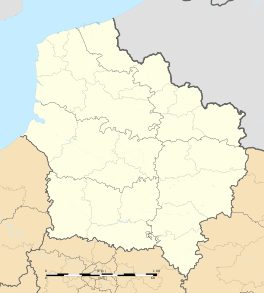Bullecourt
| Bullecourt | ||
|---|---|---|
| ||
 Bullecourt | ||
|
Location within Hauts-de-France region  Bullecourt | ||
| Coordinates: 50°11′35″N 2°55′43″E / 50.1931°N 2.9286°ECoordinates: 50°11′35″N 2°55′43″E / 50.1931°N 2.9286°E | ||
| Country | France | |
| Region | Hauts-de-France | |
| Department | Pas-de-Calais | |
| Arrondissement | Arras | |
| Canton | Croisilles | |
| Intercommunality | Arras | |
| Government | ||
| • Mayor (2001–2008) | Jules Laude | |
| Area1 | 6.43 km2 (2.48 sq mi) | |
| Population (2009)2 | 243 | |
| • Density | 38/km2 (98/sq mi) | |
| Time zone | CET (UTC+1) | |
| • Summer (DST) | CEST (UTC+2) | |
| INSEE/Postal code | 62185 / 62128 | |
| Elevation |
74–104 m (243–341 ft) (avg. 92 m or 302 ft) | |
|
1 French Land Register data, which excludes lakes, ponds, glaciers > 1 km² (0.386 sq mi or 247 acres) and river estuaries. 2 Population without double counting: residents of multiple communes (e.g., students and military personnel) only counted once. | ||
Bullecourt is a commune in the Pas-de-Calais department in the Hauts-de-France region in France.
Geography
Bullecourt lies on the Upper Cretaceous plain of Artois between Arras and Bapaume and east of the A1 motorway. This satellite photograph shows Bullecourt just north of centre. Quéant is the larger of the two villages near the eastern edge. The A1 and the high-speed (TGV) railway line run up the western edge. To the south of Bullecourt, a now closed local railway line snakes from east to west.
Population
| Historical population | ||
|---|---|---|
| Year | Pop. | ±% |
| 1793 | 490 | — |
| 1800 | 522 | +6.5% |
| 1806 | 522 | +0.0% |
| 1821 | 532 | +1.9% |
| 1831 | 583 | +9.6% |
| 1836 | 556 | −4.6% |
| 1841 | 601 | +8.1% |
| 1846 | 617 | +2.7% |
| 1851 | 593 | −3.9% |
| 1856 | 543 | −8.4% |
| 1861 | 503 | −7.4% |
| 1866 | 490 | −2.6% |
| 1872 | 527 | +7.6% |
| 1876 | 559 | +6.1% |
| 1881 | 547 | −2.1% |
| 1886 | 488 | −10.8% |
| 1891 | 512 | +4.9% |
| 1896 | 506 | −1.2% |
| 1901 | 458 | −9.5% |
| 1906 | 423 | −7.6% |
| 1911 | 396 | −6.4% |
| 1921 | 181 | −54.3% |
| 1926 | 273 | +50.8% |
| 1931 | 281 | +2.9% |
| 1936 | 288 | +2.5% |
| 1946 | 321 | +11.5% |
| 1954 | 330 | +2.8% |
| 1962 | 296 | −10.3% |
| 1968 | 264 | −10.8% |
| 1975 | 245 | −7.2% |
| 1982 | 248 | +1.2% |
| 1990 | 260 | +4.8% |
| 1999 | 251 | −3.5% |
| 2006 | 239 | −4.8% |
| 2009 | 243 | +1.7% |
Transportation
Bullecourt lies in the triangle made by the A1, A2 and A26 motorways and that made by the N17, N30 and D939 roads.
History
There were remains from the Gallo-Roman period and the village was mentioned under the name "Bullecortis", in 1096.
In 620, it was the birthplace of Saint Vindicien, a follower of Saint Eligius, known in French as Saint Eloi. Vindicien became successively, bishop of Arras and bishop of Cambrai. He is regarded as the founder of the abbey named after his mentor, Mont St Eloi, of which Bullecourt became a lordship.
The village has twice been completely destroyed: in 1543 and in 1917. As a result of events in the latter year, Bullecourt is part of Australian, ANZAC history. This arose as part of the Battle of Arras in the spring of 1917, when Bullecourt lay at the southern end of the battle front. See Australian 4th Division (World War I). The 62nd Division was part of the same battle in the sector adjoining that of the ANZACs and facing the part of the Hindenburg Line which lay in the village itself. They returned to the sector formerly occupied by the Australians, later in May. The Musée Jean et Denise Letaille now commemorates this fighting.

Sights
While there were many bunkers and dugouts, from the period of the Hindenburg Line, there is also an underground shelter from the 17th century.
The church of St. Vlaast was rebuilt after 1918.
There is a museum of objects collected from the periods of the world wars.
Economy and village life
The economy is one of general farming with the raising of beef. The village has an agricultural cooperative.
The village festival is held on the first Sunday of June and there is a festival in honour of the Australians on the last Saturday in April.
See also
References
External links
| Wikimedia Commons has media related to Bullecourt. |
- Bullecourt on the Quid site (French)
- Bullecourt: First World War
- An Australian view of the Bullecourt fighting
- memorials
- Interpretation of the Hindenburg Line photograph.
- "First Battle of Bullecourt". Australian Military Units. Australian War Memorial. Retrieved 2007-01-19.
